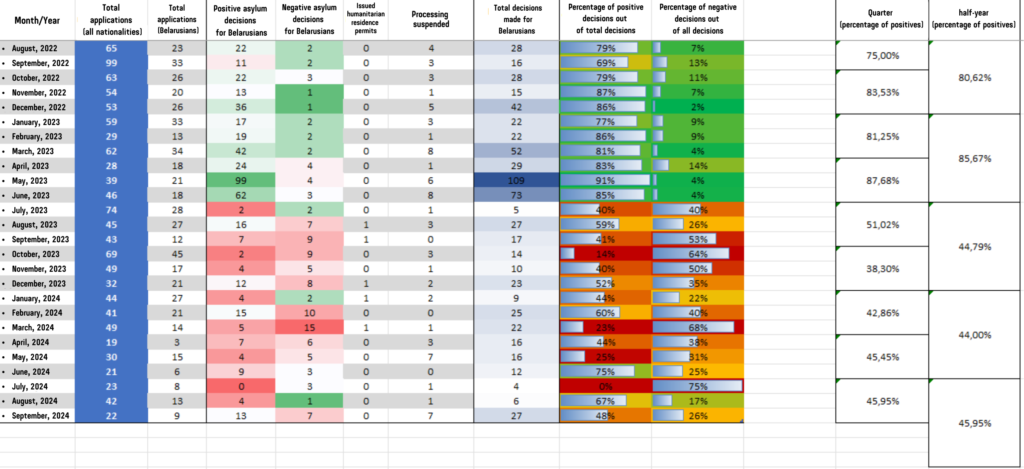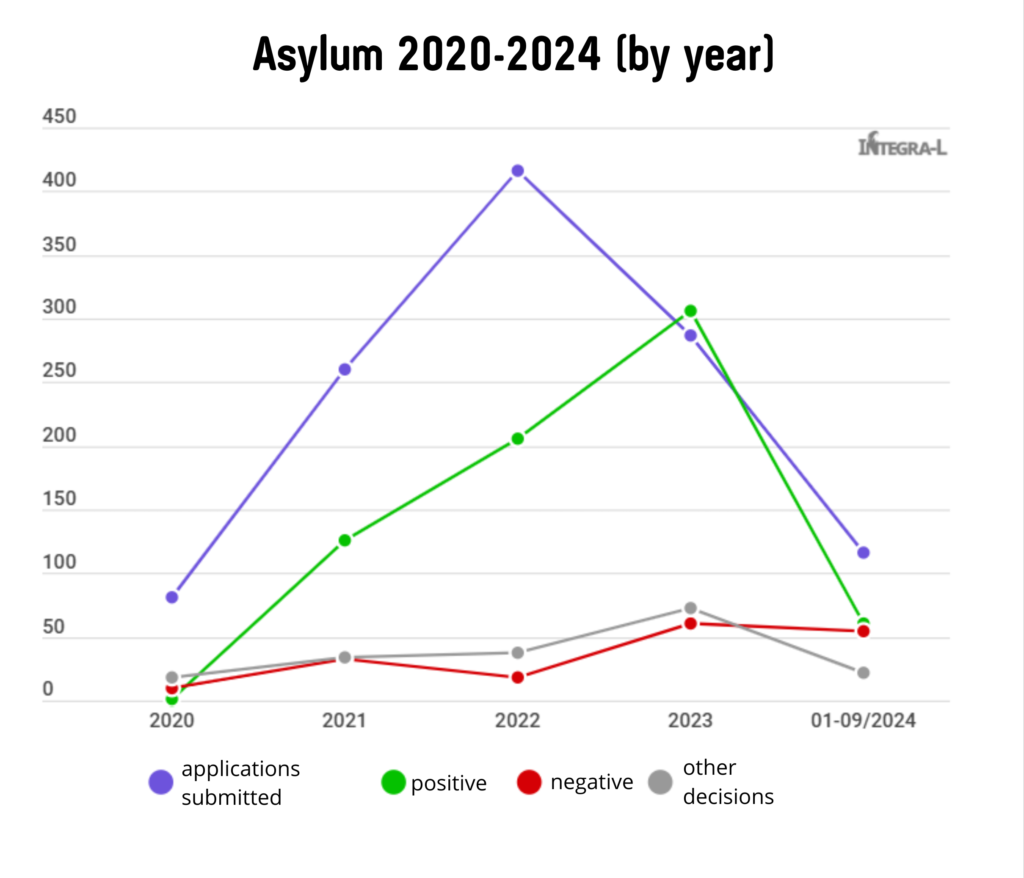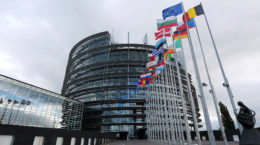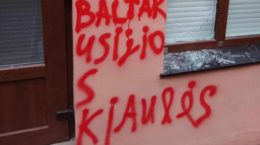The International Center for Civil Initiatives “Our House” has prepared a monitoring of mass discrimination against Belarusians in Lithuania, including pressure on human rights defenders and activists and attempts to deport Belarusian democratic activists and conscientious objectors to Belarus, mass recognition of Belarusians as a threat to national security on fictitious grounds, discrimination against Belarusian businesses, and more
The International Center for Civil Initiatives “Our House” is a Belarusian public human rights organization registered in Vilnius (Lithuania) since 2014 and currently located in exile in Lithuania.
The International Center for Civil Initiatives “Our House” has been nominated for the Nobel Peace Prize in 2024.
The International Center for Civil Initiatives “Our House” is a laureate of many international human rights awards:
-
2024 – Ludwig Bauman Prize, Germany
-
2023 – Sean MacBride Peace Prize, Germany
-
2022 – Human Rights Award of the City of Weimar, Germany
-
2019 – the International Peace Award – Bremen, Germany.
Director of the International Center for Civil Initiatives “Our House” Olga Karach is also a laureate of international awards:
-
2023 – Alexander Langer International Peace Prize, Italy
-
2010 – International Award “For civil courage” – Radebeul, Germany
-
2007 – “Person of the Year” – Amnesty International for Belarus (for being best in Human Rights defense).
The goal of the human rights organization “Our House” is the active and broad protection of human rights and support for the most vulnerable and marginalized groups of the population, with a special emphasis on women and children who easily become victims of human rights violations in Belarus, as well as support for refugees from Belarus / Ukraine in the territory of the Republic of Lithuania and other countries of the European Union. Also, at the moment, in connection with the war in Ukraine, the priority of the organization has become all kinds of and broad support for Belarusian conscientious objectors and deserters in order to prevent the invasion of the Belarusian army into Ukraine.
The International Center for Civil Initiatives “Our House” strives to fill those gaps in the area of human rights protection that are not covered by our colleagues from other human rights organizations, and also tries to coordinate its activities with specialized organizations on the topics that the organization deals with.
When assessing the collected data, human rights defenders of the International Center for Civil Initiatives “Our House” relied on specific cases of Belarusians in Lithuania and documents provided by Belarusians, as well as on their professional knowledge and many years of experience in the field of human rights protection, as well as on public sources, including official data from the Lithuanian Migration Department, the Lithuanian National Security Department, and independent media. We are grateful to our partners and colleagues for additional information. This thematic report is for informational purposes only and does not create/entail rights or legal obligations when considering individual cases.
Monitoring the rights of Belarusians in Lithuania is complicated by the previous traumatic experience of Belarusians who fell under repression in Belarus, and the acute post-traumatic syndrome of Belarusians who are justifiably afraid of deportation to Belarus as a reaction of Lithuanian state bodies if Belarusians talk about discrimination and violations of their rights in Lithuania.
Content:
-
General situation citizens of the Republic of Belarus in the Republic of Lithuania.
-
Massive, unfounded (replete with contradictory arguments, unfounded assumptions, fantasies, far-fetched and biased risk assessments, as well as a lack of knowledge about the profile of Belarus) denials of political asylum to Belarusians who have fallen under repression, in violation of Directive 2011/95/EU and the Refugee Convention.
-
Massive unfounded recognition of Belarusians as a threat to Lithuania’s national security
-
Recommendations
-
Conclusions
-
Supplement
-
Links *most of the articles linked are in Russian or Lithuanian, so it is recommended to use the automatic translation of the web page
1. General situation concerning citizens of the Republic of Belarus in the Republic of Lithuania
As of April 1, 2024, 62,884 Belarusian citizens legally reside in Lithuania.i,ii
At the moment, the state policy of Lithuania and the work of socio-political institutions controlled by the ruling coalition, including the media and bloggers, are aimed at creating hostile and discriminatory conditions for Belarusians in Lithuania. There is a hidden expulsion of Belarusians from Lithuania to other countries.
In Lithuania, the following rights and basic legal principles are grossly violated against Belarusians:
-
the principle of equality regardless of origin is violated;
-
the right to freedom, life and inviolability is violated;
-
violation of the Non-Refoulment principle. (The practice of deporting democratic activists and conscientious objectors to Belarus contributes to forced labor (slavery) in prisons and torture in Belarus, and also increases the risk of dying in a Belarusian prison due to lack of access to medical care and torture;)
-
the principle of legal capacity has been violated;
-
the right to work has been violated;
-
arbitrary expulsions occur without evidence of guilt, only on the basis of subjective assumptions and fantasies;
-
the principle of the presumption of innocence has been violated on a massive scale;
-
the principle of family integrity has been violated;
-
freedom of thought, conscience and religion has been violated.
Thus, a number of articles of the Universal Declaration of Human Rights, the Convention against Torture and other fundamental documents are violated in Lithuania with respect to Belarusians.
According to the Belarus Business Center, Lithuania has become a leader in discrimination against owners of Belarusian origin. The result of these discriminatory practices was a 37% reduction in the number of their businesses in Lithuania in 2023 (from 1,345 to 850).iii,iv
2. Massive, unfounded (replete with contradictory arguments, unfounded assumptions, fantasies, far-fetched and biased risk assessments, as well as a lack of knowledge about the profile of Belarus) denials of political asylum to Belarusians who have fallen under repression, in violation of Directive 2011/95/EU and the Refugee Convention.
In violation of Directive 2011/95/EU and the Refugee Convention, the Lithuanian Migration Department is refusing to grant political asylum to Belarusians without justification.
Between August 2022 and May 2024, the average percentage of Belarusians denied political asylum in Lithuania increased more than 6-times, with an obvious deterioration in the human rights situation in Belarus.v
The number of cases reviewed for requests for political asylum from Belarusians has decreased, and a significant (more than 30%) number of “hanging” cases has appeared. They may also affect the statistics in the future.
A sharp jump in the average percentage of refusals of political asylum for Belarusians occurred in mid- to late summer 2023, when problems related to the so-called “Litvinism” and the mass recognition of Belarusians as a so-called “threat to Lithuania’s national security” began to spread.
The period under consideration: August 2022 – September 2024 (before this, the Migration Department did not provide statistics by month) (Fig. 1, Fig. 2)
The statistics contain indicators that deviate from the norm:
– May and June 2023 (Fig. 3), when there was a surge in decision-making following mass indignation and protests by asylum seekers due to the exceeding of the processing time limits (UTPĮ 81(1));
– July 2023 and July 2024, when, on the contrary, decisions were practically not made (probably due to vacations of department employees).
There is a clear contrast between the two periods:
– Before July 2023, the share of positives consistently outweighed the share of negatives and averaged 84%.
– After July 2023, this value dropped to 44%, that is, it decreased almost 2 times.
Such a jump could not have occurred as a result of a change in the quality of cases of asylum seekers, since the change in trend is too abrupt.
If we look at the statistics by year (Fig. 4), we can see that the number of applications submitted is almost equivalent to the figure for 2020, when the repressions were just beginning. That is, Belarusians are stopping asking Lithuania for protection (probably due to Lithuania’s bad reputation with Belarusians). The number of positive decisions in 2024 is almost equal to the number of negative decisions. The number of negatives for 9 months has almost reached the value for the whole of 2023 and is almost 2 times higher than the value for 2022, which cannot be said about the number of positives. Also, about 100 cases remain pending, most of which are seriously delayed.
|
|
|
Fig. 1 |
|
|
|
Fig. 2 |
|
|
|
|
Despite the huge number of resolutions and reports on massive human rights violations in Belarus, arrests and persecution of democratic activists, human rights defenders, journalists and conscientious objectors, the main wording of the refusal of political asylum by the Lithuanian Migration Department is that Belarusians who participated in the 2020 protests, as well as independent journalists, anti-war activists and conscientious objectors are not in danger in Belarus and it is safe for them to return back. But at the same time, the National Security Department of Lithuania categorically states that it is unsafe for Lithuanian citizens to visit the Republic of Belarus and strongly recommends refraining from such trips. vi,vii
At the same time, due to the fact that it is practically impossible for a Belarusian asylum seeker to obtain another status for legalization in Lithuania, if political asylum is denied, a Belarusian activist, human rights defender, journalist, conscientious objector or deserter becomes an illegal immigrant in Lithuania and other EU countries with the risk of deportation to Belarus. The Migration Department intimidates Belarusians who have been denied political asylum with threats of deportation, forcing them to leave for third countries.
When making decisions on refusal to grant asylum, the most common formulation is that fears of persecution in the Republic of Belarus are interpreted as “hypothetical”. In essence, the Lithuanian migration authorities deliberately substitute concepts when denying political asylum and international protection, replacing ‘well-founded fears’ substantiated by objective evidence with ‘hypothetical fears’. The legal practice carried out by the Republic of Lithuania is such that the Migration Department and the courts accept and agree with the facts that administrative and/or criminal prosecution is provided for in the Republic of Belarus for opposition activities (based on testimony and evidence in the form of supporting documents, photo and video materials, etc.) of the applicant, but they require evidence that it will be applied specifically to the asylum seeker in the event of his return to the Republic of Belarus (which in itself is absurd and tantamount to requiring a person fleeing military action to provide evidence that there is an intention of third parties to cause harm to life and health especially to him), which fundamentally contradicts the interpretation of the concept of “Well-founded fears” from the point of view of international law and, in particular, the application of the principle of non-refoulement. (As thousands of people are currently serving sentences in Belarusian prisons, detentions continue and repressions have intensified in the run-up to the new presidential elections on 25.01.2025. Hundreds of people are detained upon returning to Belarus. Since the Belarusian authorities, realizing that a person who has left the country will not return if he knows that administrative or criminal prosecution has been opened against him, they do not notify about this and detain after passing border control upon returning to the Republic of Belarus. This practice, among other things, is aimed at complicating the receipt of international protection by citizens of Belarus, since there is no actual evidence of persecution.
“At least 207 detainees upon return to Belarus: current statistics from “Viasna” for 2023”.viii
The practice of refusing to grant asylum to applicants who have already been arrested and imprisoned in the Republic of Belarus is also widely used. These refusals are justified by the following: if the fact of persecution has already occurred, then there can be no fear of persecution in the future. Unfortunately, the existing repressive practice in Belarus speaks of the exact opposite, and this approach demonstrates an absurd, subjective, biased and absolutely untrue assessment of the applicant’s risks.
There is at least one known case of refusal to accept an application for international protection without any clear explanation of the reason for the refusal and with a proposal to legalize in the Republic of Lithuania in another way, despite the fact that the applicant presented all the necessary and sufficient evidence of his actual persecution in the Republic of Belarus for his opposition activities, which in principle runs counter to the practice of considering and granting international protection and is a case of flagrant violation of human rights in the area of providing international protection.
It is worth noting that the advice to legalize one’s stay in the Republic of Lithuania “in another way” (it is not specified in what way) very often follows in the resolution on refusal of the asylum application of the Migration Department. Which may indirectly indicate the unwillingness of the Lithuanian authorities to provide this type of legalization on the territory of the Republic of Lithuania.
All known cases of absurd formulations of refusals are presented in the Supplement to this monitoring.
In essence, there is an active, hidden expulsion of repressed Belarusians from Lithuania and the EU to third countries, where it is unsafe for Belarusian democratic activists and conscientious objectors to be, since there is a practice of extraditing them to Belarus. The refusal to grant asylum and a humanitarian visa in Lithuania applies to all countries of the Schengen Agreement. Thus, those who receive such a refusal are effectively deprived of any opportunity to stay and legalize themselves in a safe country.
It should be noted that Belarusians apply for political asylum only as a last resort, if there is no other possibility of legalization (economic residence permit, humanitarian residence permit, family residence permit, etc.). For example, from August 2022 to March 2024, Belarusians submitted only 465 applications for political asylum. The reluctance of Belarusians to apply for political asylum in Lithuania is due to the awareness of the high risk of refusal and subsequent difficulties in legalization in the EU and the Schengen Area, the inconsistent policy of the Lithuanian authorities towards Belarusians as an ethnic group, a ban on work for asylum seekers in the complete absence of any state support, etc. In fact, asylum seekers find themselves in a very difficult financial situation and are forced to work illegally to support themselves and their families. At the same time, many of them have experienced torture in Belarus, suffer from acute post-traumatic stress disorder and need psychiatric help and medications, to which they do not have access.
The procedure for obtaining a humanitarian residence permit in Lithuania for Belarusians is not transparent and depends on the personal preferences of the employees of the American human rights organization Freedom House, which has an absolute monopoly on the processing of documents for applying for a humanitarian residence permit (without a letter of guarantee from Freedom House, the Ministry of Foreign Affairs of Lithuania refuses to issue a letter of guarantee for Lithuanian migration), which creates grounds for abuse and manipulation, and also puts Belarusian activists, human rights defenders and journalists in a very dependent and vulnerable position.
3. Massive unfounded recognition of Belarusians as a Threat to Lithuania’s national security.
The Lithuanian National Security Department manipulates and abuses the concept of “threat to national security of Lithuania” in relation to Belarusians, massively adding them to the lists of “persons threatening the national security of Lithuania” – not on the basis of real threats and facts of committing crimes, but only on the basis of assumptions, suspicions, rumors, fantasies, therefore, the same wording “may be a threat to national security” usually appears in the documents. This “may be“, i.e. assumption, is enough to declare a person a threat to the national security of Lithuania and deprive him of his legal status in Lithuania, as well as add him to the European databases of persons threatening security with a ban on entry to the EU from 3 to 5 years. Adding a Belarusian to the lists of potential threats to the national security of Lithuania makes it almost impossible for Belarusians to legalize in another EU country, which poses a threat to the freedom, health and life of Belarusians who have fallen under repression in Belarus and for this reason are unable to return to Belarus. The lists of threats to national security include victims of state slavery, electricians, accountants, bankers, firefighters, former employees of state bodies, conscientious objectors, etc., i.e. people who had ties to the army or state organizations of Belarus in the past. Also included in the lists of threats to national security of Lithuania were anti-nuclear activists, Belarusian researchers who investigated Belarusian-Lithuanian corruption schemes, Belarusian human rights activists who defend the rights of Belarusians in Lithuania, etc. All these categories of Belarusian citizens face immediate deportation to Belarus with the risk of imprisonment in Belarus for their social, political, civic activity and their beliefs. On April 17, 2024, the National Security and Defense Committee of the Lithuanian Parliament adopted amendments to the bill, which will also recognize Belarusians who travel to Belarus more than once every three months as a threat to Lithuania’s national security.ix
The absence of evidence of a threat to national security contradicts the basic principle of the presumption of innocence, is an arbitrary or discriminatory restriction and is legally hypothetical, and the absence of an obligation for the Lithuanian National Security Department to provide evidence of a threat to national security in court deprives a person of the right to an objective trial and legal capacity.
In just one year (from November 2022 to November 2023), 1,644 citizens of Belarus and 300 citizens of Russia were recognized as a threat to national security, which directly indicates the biased and discriminatory nature of the attitude towards Belarusians and Belarus.x
Lithuanian intelligence services, including the State Security Department (DGB), which is responsible for civilian intelligence and counterintelligence, have been saying since 2022 that Belarusian migrants are likely to include people sent by the Lukashenko regime or Russian intelligence. According to the DGB, the activity of Belarusian intelligence services such as the KGB, GRU and GUBOPiK, the latter of which was created to combat the opposition, has reached a “historically” high level in Lithuania.xi
But at the same time, in fact, only one public case of detention of a Belarusian citizen for espionage in Lithuania is known out of almost 63,000 Belarusians.xii
Basically, citizens of Lithuania are engaged in espionage for the KGB of Belarus. And this is explained at least by the obvious fact that in the modern world, a spy is not a person with a suitcase of special equipment and binoculars, but someone who has access to databases or sensitive state information. And the fact that citizens of the Republic of Belarus in Lithuania are not employed in the public sector is a direct confirmation that Belarusians do not pose a threat to Lithuania (Belarusians are mainly employed in the areas of logistics, construction, and the private sector).
In May 2023, Belarusian citizen Vasily Veremeychik,xiii a former volunteer of the Kastus Kalinouski Regiment, was deemed a threat to Lithuania’s national security.xiv This decision was based on the fact that he graduated from a military academy in Belarus in 2014 and served under contract in the Belarusian army until 2016. Lithuania banned him from entering all EU and Schengen countries for 2.6 years. Veremeychik left for Vietnam, where his friends lived, but on November 13, 2024, he was arrested and handed over to the Belarusian authorities. In Belarus, he faces the death penalty, as the Kastus Kalinouski Regiment is classifiedxv as a terrorist organization there.
In 2024, 224 Belarusians xvi were recognized as a threat to Lithuania’s national security.
Kauno diena recently reported that by May 22, 2024, VSAT (Lithuanian State Border Guard Service) had executed 59 deportation decisions, including 21 Belarusian citizensxvii and 10 Russian citizens. According to data from the Migration Department, in 2024:
-
69 Belarusian citizens were denied temporary residence permits upon their first application,
-
67 Belarusian citizens were denied renewal (extension) of their temporary residence permits, and
-
52 Belarusian citizens had their temporary residence permits revoked (the revocations occurred after receiving information about potential threats, without waiting for the individual to apply for a renewal).
“Speaking about citizens of Belarus, these are 224 people who were recognized as posing a threat. At the same time, we have 9 cases when the State Border Service forcibly deported such persons from Lithuania,” says Minister of the Interior Agnė Bilotaitė.
“Since this is a threat to society, we deliver him to the state border, where he goes through border control himself and leaves for the Republic of Belarus. We joke, we provide transfer for foreigners,” explains the head of the Migration Department, Audrius Šantaras.
– We believe that this statement by a high-ranking official is the highest form of cynicism towards Belarusians, some of whom apparently took part in the protests and may be subject to repression in Belarus after being deported from Lithuania!!!
“The Security Department and other agencies have started to check these people very seriously, they may be unhappy, but we really should not interfere with the security service doing its job,” says Žygimantas Pavilionis, Chairman of the European Affairs Committee.
“Seeing that he is gaining a foothold, perhaps gaining access to some information or to some subjects, the Belarusian special services may try to activate him and make him work in their interests. This risk is really high,” Kaščiūnas asserts.
In Lithuania, a number of anti-Belarusian Lithuanian politicians have launched active political manipulations and speculations on the topic of fictitious territorial claims of Belarusians to Vilnius and doubts of Belarusians in the territorial integrity of Lithuania. In reality, “Litvins” are called by Belarusians with Christian-conservative views, who want to distance themselves as much as possible from the Soviet past of Belarus and any ties with Russia, advocating for Belarus to join the European Union and NATO. Until now, not a single Lithuanian politician or Lithuanian journalist has cited a single case where a Belarusian politician, activist, human rights defender, or journalist would question the territorial integrity of Lithuania or speak out on the topic that Vilnius should be returned to Belarus. However, the Minister of Defense of Lithuania and former Chairman of the Committee on Defense and National Security of the Lithuanian Seimas Laurynas Kašiūnas, as well as some other Lithuanian politicians, groundlessly and based on their own conjectures and fantasies, attribute “anti-Lithuanian” sentiments to the Belarusian diaspora in Lithuania, for some reason calling it “Lithuanism”.xviii,xix
The absence of any evidence of Belarusian territorial claims did not prevent Lithuanian politicians from even talking about criminal liability for “Lithuanism”.xx
Once again, the presumption of innocence does not apply to Belarusians in Lithuania, and decisions on Belarusians are made based on fantasies, conjectures, rumors and political speculations. The Lithuanian media has launched a campaign of bullying and actively uses hate speech against Belarusian migrants and refugees. High-ranking politicians (Lithuanian President Nausėda,xxi Minister of Defense and former Chairman of the National Security xxii and Defense Committee of the Lithuanian Parliament Kaščiunas, Minister of Internal Affairs Bilotaitė and others), a number of public institutions, including the Lithuanian National Security Department of Lithuania, are participating in the bullying of Belarusians. Here are typical headlines in Lithuanian media, which are intended to form a hostile and negative attitude towards Belarusians as an ethnic group among Lithuanian readers: “The Lithuanian State Security Department warns of a threat emanating from Belarusians”, “Adviser to the Lithuanian president considers Belarusians a fifth column”xxiii, “The head of the Lithuanian Ministry of Internal Affairs hopes that politicians will decide to unify sanctions against citizens of Russia and Belarus” (Bilotaite:xxiv “Considering the security situation, we believe that it is worth reconsidering a return to a similar regulation of sanctions against citizens of Belarus”)xxv, “Lithuania proposes tightening restrictions for citizens of Belarus”, etc.
Lithuanian politicians are publicly calling for a legislative ban on Belarusians from turning to Lithuanian courts to challenge decisions by the Lithuanian Migration Department and the Lithuanian National Security Department to deny political asylum or revoke a residence permit.xxvi
The Lithuanian Migration Department publicly calls attempts by Belarusians to appeal political asylum denials “abuse,” thereby publicly denying the very right of Belarusians in Lithuania to a fair trial.xxvii
Lithuanian media are openly calling for violent actions against Belarusians. For example, blogger Algis Ramanauskas openly calls for damaging cars with Belarusian license plates, openly calls Belarusians “individuals of extremely low social quality”, “sick”, “biomass”.xxviii
In Lithuania, there are “Litvin hunters” (“Litvins” is what pro-European Belarusians who try to distance themselves from Belarus’s Soviet past call themselves), i.e. “Belarusian hunters” who disrupt cultural events held by the Belarusian diaspora in Lithuania and carry out other attacks against Belarusians. Belarusians often receive threats in Lithuanian in their personal messages, threatening adults and children with death, sometimes signing themselves Bloody Nazi and writing that Lithuania is for Lithuanians.
On the night of July 28, 2024, unknown persons desecrated the building of the Belarusian Kropka store in Vilnius.xxix On the wall at the entrance, they left a xenophobic inscription in Lithuanian: “Come home, Belarusian pigs” with numerous errors. A preliminary investigation has been launched into the fact of “destruction or damage to property”.
On September 4, 2024, someone broke the windows of the Belarusian Cultural Center in Vilnius, the organization reported on social media. Its representatives have already contacted the police.
On September 4, 2024, in Vilnius, the windows of a church where the Belarusian Orthodox parish of the Constantinople Patriarchate holds services were shot at.xxx
On the night of September 4-5, 2024, near the office of the Belarusian volunteer organization “Dapamoga”, literally on the eve of the organization’s birthday in Vilnius, unknown people left an offensive inscription in Lithuanian “Baltarusų parazitams čia ne vieta”, which translates roughly as “Belarusian parasites have no place here”, – its representatives reported on social networks. In this regard, the director of “Dapamoga” contacted the police.xxxi
On the morning of October 26, 2024, unknown persons set fire to the doors of the “Belarusian Social and Cultural Center” in Vilnius, wrote “Get out of Lithuania” and damaged graffiti with “DJs of Change”. Representatives of the organization contacted the police.xxxii
On November 5, 2024, unknown vandals painted xenophobic inscriptions on the Belarusian “Karchma 1863” in Vilnius. One of the passers-by noticed this and posted a photo on social networks. The footage shows that the door of the establishment is painted in red: “Lietuva lietuviams” (“Lithuania to Lithuanians”).xxxiii
According to information published by LRT.lt, Belarusian citizens in Lithuania who are asylum holders or asylum seekers have received phone calls and messages from unknown persons claiming to be employees of the Migration Department or the State Security Department. The callers demanded that they appear at the central building of the State Security Department to fill out a questionnaire and asked questions related to the activities of the Belarusian democratic opposition.
The Migration Department and the National Security Department of Lithuania confirmed that these calls were false and provocative.xxxiv, xxxv
It should be noted that SIM cards of mobile operators in Lithuania can be purchased by anyone without presenting an identity document, and the only organization in Lithuania that has access to the database of Belarusian citizens who have a residence permit (RP) or permanent residence (PR), or are asylum seekers, is the Migration Department of the Republic of Lithuania. People who received such threats contacted the police, but so far no public statements have been made about the results of the investigations, and nothing is known about the measures taken.
In addition, in February 2024, many Belarusians in Lithuania received calls from unknown persons introducing themselves as employees of the Migration Department, with messages that they were allegedly recognized as a threat to national security and must leave the country. These cases were also regarded as provocations, and the Migration Department published a refutation on its website. However, such incidents continue to occur, the perpetrators and those responsible for the leak of personal data of Belarusians have not been found and brought to justice. These cases require critical attention and investigation, since along with the contact database, other confidential information may also end up in the hands of criminals, on which the safety, freedom and life of citizens of the Republic of Belarus located in the Republic of Lithuania, as well as their relatives and friends in the Republic of Belarus, may directly depend.
In Lithuania, anti-Belarusian discriminatory laws are constantly being adopted. On April 25, 2024, the Seimas of Lithuania extended national sanctions against citizens of Russia and Belarus for a year (26). This law has seriously affected Belarusians who are in opposition to Alexander Lukashenko and the Belarusian regime. At the same time, KGB officers, Belarusian propaganda and those who openly support Lukashenko’s regime have not suffered from the sanctions.xxxvi
In Lithuania, all conditions are being created to make it impossible to appeal the decision to cancel a residence permit or refuse political asylum, i.e., in essence, a Belarusian is deprived of access to legal protection.xxxvii From July 1, 2024, the decision to cancel a residence permit in Lithuania comes into force immediately, and is not suspended, as it was before. Previously, a foreigner who filed a complaint with the court was left with a residence permit and permanent residence card for the duration of the trial. Now, regardless of whether a Belarusian filed a complaint against the department’s decision or not, he must leave the territory of Lithuania within 14 days after the cancellation of the residence permit. Otherwise, he will be issued a decision on deportation to Belarus. If the “undesirable guest” ignores this decision, he will simply be deported and banned from entering Lithuania from now on, which effectively means a ban on entry to all Schengen countries. This creates a serious threat for Belarusian activists, human rights defenders and journalists to be deported to Belarus and end up in a Belarusian prison, deprives them of the right to protection and trial, and also threatens their health and directly contradicts Article 3 of the Convention against Torture 39/46 UN General Assembly of 10.12.1984.
Such anti-Belarusian policy of Lithuania has led to a sharp reduction in the number of Belarusians who arrived in Lithuania.xxxviii If we look at the dynamics of changes in the number of Belarusian diaspora in Lithuania in recent years, we can see a clear slowdown in growth, which began in the 3rd quarter of 2023. And if in the first half of 2023 the number of Belarusians in Lithuania increased by 9,543 people, then in the same period of the current year it increased by only 368 people. That is, the increase in the number of Belarusian diaspora in Lithuania is now 25 times less than a year ago.
4. Recommendations
-
To review all refusals of political asylum to Belarusians in Lithuania and adopt objective, documented judicial decisions on asylum based on Directive 2011/95/EU and the Refugee Convention.
-
To adopt a transparent and clear procedure for issuing humanitarian residence permits to Belarusians if it is impossible to return to Belarus.
-
Completely exclude the deportation of Belarusians to Belarus as a violation of Article 3 of Convention 39/46 of the UN General Assembly of 10.12.1984.
-
When considering a request for asylum by a citizen of the Republic of Belarus in the countries of the European Union, as well as Switzerland, Norway, Iceland and Liechtenstein, after a refusal in the Republic of Lithuania, guided by Regulation (EU) of the European Parliament and of the Council No. 604/2013 (Dublin III), to apply the “Right of Sovereignty”
-
To stop the practice of unsubstantiated recognition of Belarusians as a threat to the national security of Lithuania with the wording “may be a threat to the national security of Lithuania.” Cancel all decisions on recognition of a threat to the national security of Lithuania, where the construction “may be” is used and public and convincing evidence is not provided, and also publicly apologize to all Belarusians who have become victims of such decisions, which are purely hypothetical.
-
To stop discrimination against Belarusian businesses based on nationality in Lithuania.
-
To stop the use of hate speech in Lithuanian media against Belarusians living in Lithuania, including qualifying calls for violence against Belarusians as an ethnic and social group as a crime of “inciting ethnic hatred.” Punish citizens who openly and publicly call for violence against Belarusian citizens and their property. Stop adopting discriminatory laws against Belarusians living in Lithuania solely on the basis of their nationality. Create an anti-discrimination commission to assess laws and other acts that create special conditions based on nationality, with the participation of representatives of the International Center for Civil Initiatives “Our House”, as well as other representatives of the Belarusian diaspora, the press, and international independent human rights organizations.
-
To cancel all discriminatory laws already adopted against Belarusians as an ethnic and social group based on their nationality.
-
To conduct a thorough investigation of all cases related to the possible leakage of personal information of citizens of the Republic of Belarus living in the Republic of Lithuania, and inform the public about the results of the investigation.
5. Conclusions
Many Belarusians who, in 2020, selflessly fought for freedom and democratic values, were the object of universal admiration of the civilized democratic world, an example of fortitude and dignity of honor, fearlessly challenging the totalitarian-militaristic regime of Alexander Lukashenko, and, subsequently, were forced to leave their homes and their country, fleeing persecution by the dictatorial regime, unfortunately, were faced with the need to continue the struggle for their own survival and freedom in a country that positions itself as democratic, is a signatory to international agreements on the protection of human rights and legally guarantees protection from politically motivated persecution, and is also the closest neighbor to Belarusians both in geographical and cultural-historical aspects. Belarusians who sought asylum in Lithuania, which declares the protection of democratic rights and human freedoms as its highest value, after all their hardships and trials (many swam across icy rivers and broke through swamps, risking losing their lives, health or being arrested, others first made a long journey through many countries in the hope of receiving asylum), are massively denied asylum and threatened with deportation without the right to return, if they are recognized as a threat to national security, not only to Lithuania, but also to other EU countries. Now, Belarusian asylum seekers in Lithuania often do not even have the opportunity to get their passports back in order to leave for a third country and avoid the threat of deportation to Belarus, or to complete banking transactions, such as receiving a money transfer, etc. They turn off doorbells and have learned to identify among the cars the deportation minibuses of Lithuanian border guards, who will literally take them straight into the hands of the Belarusian punitive machine to hand them over to the dictatorial regime of Alexander Lukashenko in violation of the principle of non-refoulement, if they are issued a deportation order.
We would like to quote here a statement from a person who found himself in this situation:
“In 2020 and after, we fought against the dictatorship in our country, fought for freedom and democratic values. We knew why we were doing this, why and for what purpose we were taking risks, and we had no illusions about what future awaited us if we did not win “here and now,” but even this did not stop us. Yes, we were unable to achieve our goals at the moment, but no one will dispute the fact that Lukashenko’s regime before and after our protest are completely different. For example, it took Germany, Poland, the Czech Republic, and Slovakia, after the first mass protests, decades to establish democracy in their countries and overthrow the dictatorship. At the same time, we knew very well who our enemies and allies were. And that, physically being free in Belarus, even without documents, we could count on having escape routes and retreats in democratic countries. And now try to imagine the situation we found ourselves in – we are in Lithuania, we are free, we have escaped from under the dome of violence and lawlessness that is happening in Belarus, and finally we are in a country that seems to be our ally and like-minded person, declaring its full support for what we fought for at home. The feeling is euphoria. And so you ask for asylum, and you are incredibly happy that you are doing it in Lithuania, because here, as the closest neighboring state, it is well aware of all the horrors that are happening in Belarus and there is no need for additional explanations. A feeling of hope and lightness has appeared – you can breathe out and continue living. You are eagerly awaiting your interview at the Migration Department (because you are sure that this is just a formality and a stage that needs to be passed, and the facts are so obvious that they cannot be questioned), the interview and … REFUSAL … You do not understand how this is possible, you file an appeal – REFUSAL … an appeal to the highest court – REFUSAL. You do not have your passport in hand, and since you swam across the river at the border to get to Lithuania, i.e. you got here illegally or were recognized as a threat to national security, then most likely there will be a decision on deportation and they will give you your passport only during your expulsion from the country to a neutral territory (note: the territory between two countries, to which citizens of the Republic of Belarus are expelled, since there is no direct interaction between the border services of the two countries, and the agreement between the EU and the Republic of Belarus on readmission was terminated in 2021), where you will be delivered by force. The situation is literally maddening – on the one hand, you are free, in a free society, free people are walking the streets and you are physically surrounded by it. But at the same time, in your head there is an understanding – there is no passport, THERE IS NOWHERE ELSE TO RUN and at any moment you can be detained and forcibly deported to where you fled from and where prison, torture and slave life in the millstones of dictatorship await you. The human brain is designed in such a way that it does not differentiate between “yesterday, today, tomorrow, here or there”, all that is in it is “here and now” and this is truly maddening. And now you are caught by the hands of the Lithuanian state and handed over to the Belarusian regime and all that you have in this case to oppose the dictatorship at the inevitable meeting is a piece of paper with a deportation order. Two feelings that you experience … although no, only one – BETRAYAL.”
Four years have passed since the elections in Belarus, but repressions in the country have not stopped for a minute. Today, their intensification is noted in the run-up to the presidential elections of 2025 (UN monitoring Belarus for April 2024).
In Belarus, they continue to repress everyone who took part in protest initiatives against the current government, and not just individual and most ardent activists, as the Lithuanian migration service claims (although it refuses to help even such people), this fact is confirmed by the numbers of new arrests in Belarus: in the first 5 months of 2024 alone, their number amounted to about 1,500 known cases.xxxix
It is no secret that after the protests of 2020, a huge number of people who disagreed with the actions of the Belarusian authorities, who had previously been employed in the defense and strategic public sectors (which Lithuania now massively recognizes as a threat to national security), left Belarus. And against this background, today Belarus is experiencing an acute shortage of specialists in these profiles. We ask an open question:
“Who is the de facto ultimate beneficiary of the mass recognition of citizens of the Republic of Belarus as a “Threat to the National Security of Lithuania”, who have practical experience and qualifications in the defense and strategic state sectors of the Republic of Belarus, from their subsequent return to the Republic of Belarus (due to their recognition as a threat to the national security of Lithuania, since this status applies to all EU countries)?”
It is also impossible not to note the fact that Lithuania, publicly supporting the Belarusian democratic forces, and in particular the 2020 presidential candidate Svetlana Tikhanovskaya, continues to maintain a reputation in the information space as one of the closest allies of the Belarusian democratic society. But, unfortunately, in reality, the facts say the opposite – Lithuania is no longer considered an attractive and friendly country among Belarusians due to multiple risk factors and numerous cases of violation of the rights of Belarusians. The figures on the reduction in the movement of Belarusians to Lithuania and the scale of relocation from Lithuania to other EU countries speak for themselves.
6. Supplement
The Migration Department of the Republic of Lithuania, when refusing to grant political asylum to Belarusians, uses the following arguments and conclusions (most of these arguments are also supported by Lithuanian courts):
– Cooperation with an “extremist” organization will not necessarily lead to persecution in Belarus. Providing assistance to an organization recognized as extremist by its country of origin is not the same as initiating and coordinating such activity (for participation in an so called “extremist formation” in Belarus, one is threatened with 2 to 6 years in prison under Part 3 of Article 361-1 of the Criminal Code of the Republic of Belarus).
* *Since 2020, numerous media outlets, civil associations, and Telegram channels in Belarus have been labeled as extremist organizations or formations. The Ministry of Internal Affairs of Belarus frequently updates these lists, which include both independent media (such as Deutsche Welle Belarus) and political groups and solidarity organizations, such as the Coordination Council of Svetlana Tikhanovskaya and the People’s Anti-Crisis Administration led by Pavel Latushko. Popular opposition Telegram communities, like “Maya Kraina Belarus” and “I’m Coming Out/MKB,” are also among those designated as extremist formations. Belarusian authorities state that involvement in extremist formations or distributing their materials can lead to criminal charges, including imprisonment.
– Work for pro-Ukrainian organizations is not prosecuted on the territory of the Republic of Belarus, because Lukashenko maintains neutrality in the war (The Kastus Kalinouski regiment, a Belarusian volunteer formation fighting on the side of Ukraine against Russia, is included in the list of “terrorists” in Belarus).
– No case has been opened or there is no public evidence that a case has been opened, he is not on the international wanted list, which means there is no persecution and will not be, the regime does not identify him as a direct threat to itself, and does not aim to neutralize him by any means.
– He was able to legally leave in 2020, which means there was no persecution and will not be.
– He has already served his sentence, which means there will be no more persecution.
– There is a protocol and a court decision on 23.34, but it states that the asylum seeker does not admit guilt, does not agree with the protocol, which means he is not a protester, was caught by accident, and will not be persecuted. (the protesters do not agree with the charges brought against them, since participation in protests is not a crime, but the exercise of rights)
– The applicant’s relatives continue to live in Belarus and are not persecuted, which means that the asylum seeker will not be persecuted either.
– In light of the information found in open sources, the declared support for S. Tikhanovskaya is not sincere enough.
– It is noted that in 2020, more than 1 million Belarusians took part in the protests, and several hundred thousand people left the country. According to the information collected during the investigation and the certificate of the Migration Department dated ___№__, both the protesters and their relatives still live in Belarus. Hundreds of thousands of Belarusians express dissatisfaction with the current government on the Internet, but sanctions are rarely applied.
– Article 19 of the Law of the Republic of Belarus on Military Service states that the purpose of military service is to provide citizens of Belarus with basic knowledge about state defense, ensure proper physical training of citizens and foster their patriotism. Conscription for military service is carried out in accordance with the current decree of the President of Belarus.
– Not every conviction, no matter how sincere, is a sufficient reason to claim refugee status in the case of desertion or draft evasion. It is not enough that a person does not politically justify certain military actions of his government.
7. Links *most of the articles linked are in Russian or Lithuanian, so it is recommended to use the automatic translation of the web page
i https://www.delfi.lt/en/politics/russians-belarusians-and-ukrainians-in-lithuania-social-distance-remains-achallenge-96433645
ii https://www.delfi.lt/ru/news/live/v-litve-znachitelno-uvelichilos-chislo-immigrantov-iz-uzbekistana-96300607
iii https://planbmedia.io/signal/litva-metit-v-lidery-diskriminacii-belarusov-kto-v-zone-riska-i-chto-delat-biznesam.html
vi https://schengen.news/lithuania-urges-its-citizens-to-refrain-from-travelling-to-belarus-due-to-safety-reasons/
ix https://www.delfi.lt/ru/news/politics/komitet-seyma-odobril-predlozhenie-po-ogranicheniyu-poezdok-rossiyan-i-belarusov-na-rodinu-96361875
x https://www.delfi.lt/ru/news/live/ot-sankciy-do-litvinizma-s-kakimi-problemami-stolknulis-v-2023-godu-belorusyv-litve-i-est-li-puti-k-resheniyu-95489993
xi https://www.osw.waw.pl/en/publikacje/osw-commentary/2024-01-10/increasingly-distant-neighbours-lithuania-towards-belarusians
xii https://rus.lsm.lv/statja/novosti/proisshestvija/po-podozreniyu-v-shpionazhe-zaderzhan-grazhdanin-belarusi–uspelzapechatlet-17-obyektov.a466902
xiii https://www.delfi.lt/ru/abroad/global/belarusa-kotorogo-litva-priznala-nacionalnoy-ugrozoy-vetnam-peredal-vlastyam-lukashenko-emu-mozhet-grozit-smertnaya-kazn-120066668
xiv https://www.lrt.lt/ru/novosti/17/2420380/zhena-belorusa-veremeichika-uspel-napisat-docheri-odno-slovo-deportatsiia
xv https://www.svoboda.org/a/v-belarusi-priznali-terroristami-polk-kastusya-kalinovskogo-/33135065.html
xvi https://www.tv3.lt/naujiena/lietuva/lietuva-issiuncia-itarimu-keliancius-baltarusius-atgal-kai-kuriuos-isveza-per-dvi-savaites-kiti-dar-bando-bylinetis-n1369145
xvii https://www.delfi.lt/ru/news/live/podruga-deportirovannogo-belorusa-emu-tam-grozit-opasnost-ego-razyskivayut-120030103
xviii https://www.delfi.lt/ru/news/politics/deputat-obespokoen-prityazaniyami-belorusov-na-vazhnye-simvoly-litovskogo-samosoznaniya-my-dolzhny-provesti-krasnye-linii-94238327
xix https://www.lrt.lt/ru/novosti/17/2230554/shimonite-somnevaetsia-sleduet-li-vkliuchat-v-ugolovnyi-kodeksponiatie-litvinizma
xxi https://www.lrt.lt/naujienos/lietuvoje/2/1967100/nausedos-veto-seime-atmestas-rusams-ir-baltarusiams-sankcijos-lietuvoje-skirsis
xxii https://www.lrt.lt/ru/novosti/17/2185364/departament-gosbezopasnosti-litvy-preduprezhdaet-ob-iskhodiashcheiot-belorusov-ugroze
xxiv https://www.delfi.lt/ru/news/politics/glava-mvd-litvy-nadeetsya-chto-politiki-primut-reshenie-ob-unifikaciisankciy-protiv-grazhdan-rossii-i-belarusi-95271975
xxv https://www.delfi.lt/ru/news/politics/v-litve-predlagayut-uzhestochit-ogranicheniya-dlya-grazhdan-belarusi-95266361
xxvii https://www.lrt.lt/naujienos/lietuvoje/2/2233960/gudzinskaite-daugeja-leidima-gyventi-praradusiu-uzsienieciupiktnaudziavimo-atveju
xxviii https://www.tv3.lt/naujiena/lietuva/algis-ramanauskas-apie-baltarusiu-nenora-mokytis-lietuviskai-cia-jiems-yra-sunu-kalba-jie-nesiintegruos-n1304287
xxix https://www.delfi.lt/ru/news/crime/policiya-nachala-rassledovanie-v-svyazi-s-vypadom-protiv-magazina-belorusskogo-oppozicionera-v-vilnyuse-120039834
xxxii https://www.delfi.lt/ru/news/crime/v-vilnyuse-sovershili-podzhog-centra-belorusskoy-kultury-i-obshchiny-120060200
xxxiv https://www.lrt.lt/en/news-in-english/19/2210180/lithuania-s-migration-department-warns-about-fake-deportation-calls-targeting-foreigners
xxxv https://www.lrt.lt/en/news-in-english/19/2352240/lithuanian-intelligence-warns-about-fake-migration-department-calls
xxxvi https://www.lrt.lt/ru/novosti/17/2259185/parlament-litvy-na-god-prodlil-ogranicheniia-dlia-rossiian-i-belirusov
xxxviii https://motolko.help/ru-news/62-tysyachi-belarusov-zhivut-v-litve-prirost-est-no-v-25-raz-menshe-chem-god-nazad/
In order for us to help others to protect their rights, we need your help. You can help here, click on any of the buttons on the left or right, and then repost the news, like it on our social networks here, here and here, or take part in the clean-up day.





 Fig. 3
Fig. 3 Fig. 4
Fig. 4






